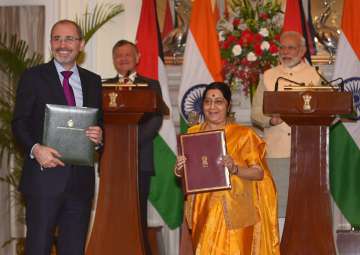India, Jordan renew support for Palestine, sign 12 agreements
Last month, Jordan facilitated Modi's transit to Palestine in what was the first ever Indian prime ministerial visit to the West Asian nation. The visit effectively de-linked Israel from Palestine.

India and Jordan on Thursday renewed their support to the Palestinian cause as the two sides signed 12 agreements, including one on defence cooperation, following a bilateral meeting between Prime Minister Narendra Modi and King of Jordan Abdullah II Ibn Al Hussein.
"Both leaders renewed their support and commitment to the Palestinian cause," T.S. Tirumurti, Secretary (Economic Relations) in the Ministry of External Affairs, said at a media briefing following the meeting.
"His Majesty was appreciative of our Prime Minister undertaking a standalone visit to Palestine through Amman," Tirumurti said.
Last month, Jordan facilitated Modi's transit to Palestine in what was the first ever Indian prime ministerial visit to the West Asian nation. The visit effectively de-linked Israel from Palestine.
Also, in December last year, India voted with the rest of the world in the UN General Assembly against US President Donald Trump's unilateral announcement recognising Jerusalem as the capital of Israel.
According to Tirumurti, King Abdullah also commended India for the "very significant" role it was playing in West Asia.
The Secretary also said that economic relations also remain an important focus of the Jordanian King's visit.
"Both leaders agreed to explore possibilities of cooperating in assisting Africa," he said. "Prime Minister mentioned about India's developmental assistance to the tune of $10 billion in lines of credit."
On Wednesday, King Abdullah met a select group of Indian CEOs and attended the India-Jordan Business Forum.
Tirumurti said both Modi and King Abdullah welcomed the signing of the MoU on defence cooperation folloiwng Thursday's meeting.
"There is keenness on both sides to take this cooperation further and we are in the process of exploring avenues for enhancing our cooperation," he daid.
"We are also looking at closer security cooperation keeping in mind the tremendous experience which Jordan has in the region."
The MoU is aimed at promoting cooperation between India and Jordan in the field of defence by defining the scope of such cooperation and making provisions for implementation of the cooperation in some of the recognised areas like training, defence industry, counter-terrorism, military studies, cyber security, military medical services and peacekeeping, according to the Ministry of External Affairs.
The two sides also signed a MoU on cooperation in the field of health and medicine.
The objective of this MoU is to establish and encourage cooperation in the fields of health, medical science, medical education and research on the basis of equality and mutual benefits in accordance with the respective legislations and regulations of India and Jordan.
The various recognised areas of mutual cooperation include universal health coverage, services and IT in health, health research, national health statistics, diagnosis, treatment and medication of tuberculosis and regulation of pharmaceuticals and medical devices.
Another agreement was signed on manpower cooperation which provides for cooperation between India and Jordan with a view to promote best practices in the administration of contract employment of the Indian nationals in Jordan.
Jordan is home to more than 10,000 Indians, who are employed in the textile, construction health and manufacturing sectors as also in fertiliser companies universities, IT and financial companies,
A MoU was also signed for setting up a next generation centre of excellence (CoE) in Jordan for training of at least 3,000 Jordanian IT professionals over a period of five years, and setting up of a resource centre in India for training master trainers in the IT field from Jordan.
Other agreements signed include long-term supply of rock phosphate and fertilisers to India, mutual assistance between India and Jordan to ensure proper application of the customs legislations in the two countries, cultural exchange programme between the two countries from 2018 to 2022 and setting up a Hindi chair in the University of Jordan.
Earlier on Thursday, King Abdullah delivered a special address on "Islamic Heritage: Promoting Understanding and Moderation" organised by the India Islamic Cultural Centre here.
Stating that the global war against terror was not between religions but between moderates and extremists, he said the airwaves and the internet should be taken back from the voices of hatred.
"Today's global war against terror is not a fight between different religions or people. It is between moderates of all faiths and communities against extremism, hate and violence," the King said while addressing the gathering here in the presence of Prime Minister Narendra Modi.
"What is heard in the news and what is shown about religion is what separates people," he said. "We need to take back the airwaves and the internet from the voices of hatred."
Modi, who also spoke on the occasion, said that the campaign against terrorism and extremism was not aimed at any religion but against a mindset that was misleading the youth to harm innocent people.
"Those who commit crimes against humanity perhaps do not know that they are harming the very religion that they claim to stand for," he stated.
"The campaign against terrorism, extremism and radicalisation is not a campaign aimed at any particular faith. Rather, it is aimed against that mindset that is misleading our youth into torturing innocent people."
King Abdullah arrived here on Tuesday on three-day state visit to India. This is his second state visit to India after his visit with Queen Rania in 2006.